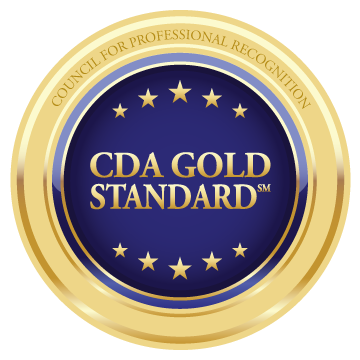For more than 30 years, the Council for Professional Recognition has promoted improved performance and recognition for professionals in the early childhood education of children from birth to five years old.
Through our comprehensive assessment of educator knowledge and classroom competence, the prestigious Child Development Associate® (CDA) credentials have set the standard for what early childhood educators should know and be able to do. The CDA® is a symbol of quality and trust.
Trust and stringent standards also are critical for training organizations. To that end, the Council wants to ensure all CDA students can obtain the high-quality training they are seeking from the variety of education providers in the field. That’s why our CDA® Gold StandardSM designation for training organizations is so important.
The Gold Standard is an earned recognition that demonstrates qualified organizations have met our rigorous criteria for student services, sound business practices and professional development – all designed to prepare students for the CDA certification exam and verification visit.
The need for the CDA® Gold StandardSM is clear: Early childhood educators and home visitors have historically come from a wide range of backgrounds — some of which require formal education and some that do not. The Council’s decades of experience and scores of research both demonstrate that students working to become early childhood educators don’t necessarily have the assurance that the courses or training in which they are participating will adequately prepare them for teaching and caring for young children.
In particular, there is a dearth of adequate training with respect to dual-language learners and children with special needs.
“About 20 percent of CDA and associate’s programs and about 10 percent of bachelor’s and master’s programs did not require any coursework in working with bilingual children learning English as a second language,” researchers from the Frank Porter Graham Child Development Institute at the University of North Carolina reported in 2006. “With the national increase in ethnic and linguistic diversity among young children, it may be important for all programs to require coursework in this area.”
The researchers also looked at practicum requirements for early educators and found that some programs — specifically 4 percent of associate’s and bachelor’s degree programs and 33 percent of master’s programs — required no student teaching or field-placement experience. Of all the associate degree programs, only 62 percent required practicum experience in working with infants and toddlers.
In addition, students in only 41 percent of those two-year programs gained experience working with children with disabilities.
 That’s where the Gold Standard comes in. It is now more important than ever for those entering the early childhood education field to know how to identify the programs that will provide both comprehensive training and solid practical experience in a range of early learning programs. Organizations with the Gold Standard designation are required to adhere to very strict rules and competencies. Those organizations must show:
That’s where the Gold Standard comes in. It is now more important than ever for those entering the early childhood education field to know how to identify the programs that will provide both comprehensive training and solid practical experience in a range of early learning programs. Organizations with the Gold Standard designation are required to adhere to very strict rules and competencies. Those organizations must show:
- Consistent quality and relevant content
- Coursework and training that is aligned with the Council’s Eight CDA® Subject Areas.
- Assurance of ethical business policies and practices.
- Support for students’ success, including access to advising on the additional steps required beyond training to qualify to receive a CDA®.
- Programs designed to accommodate the needs of all students, for example – those who are bilingual, multilingual or geographically isolated students.
There is ample evidence that organizations that go through the Gold Standard process are not only shoring up their programs, but they’re also seeing strong returns in enrollment and recognition.
Among the testimonials:
Columbus State Community College, Columbus, OH: “Since receiving the CDA Gold Standard recognition, we are getting more interest and inquiries about how to enroll in our CDA preparation program. I would also like to add that the support we are receiving from the leaders at our institution is amazing.”
Martin Luther College, New Ulm, MN: “Going through the Gold Standard application process helped us review and improve our program. We have had a good response to our program following the awarding of the Gold Standard.”
ProSolutions Training, Atlanta: “We also believe the CDA Gold Standard provides a level of validation to customers who may not be familiar with ProSolutions Training. This endorsement verifies that our coursework has been reviewed and meets the highest standards for CDA coursework.”
Simply put, the CDA® Gold StandardSM is an answer to the long-needed collaboration between high-quality early childhood educators, administrators, colleges, universities and training organizations that will add value to and ensure integrity in the early childhood profession.
To find out more about how your training organization might earn a CDA® Gold StandardSM, click here: www.cdacouncil.org/goldstandard
Suggested citation: Washington, Valora, Ph.D. The Need for CDA® Gold StandardSM Training Organizations Continues to Grow. Council for Professional Recognition. Washington, D.C. July 2019.

 That’s where the Gold Standard comes in. It is now more important than ever for those entering the early childhood education field to know how to identify the programs that will provide both comprehensive training and solid practical experience in a range of early learning programs. Organizations with the Gold Standard designation are required to adhere to very strict rules and competencies. Those organizations must show:
That’s where the Gold Standard comes in. It is now more important than ever for those entering the early childhood education field to know how to identify the programs that will provide both comprehensive training and solid practical experience in a range of early learning programs. Organizations with the Gold Standard designation are required to adhere to very strict rules and competencies. Those organizations must show: